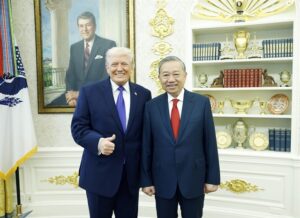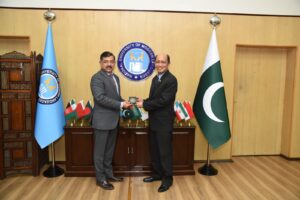Malaysia and United States Sign Landmark Memorandum on Critical Minerals Cooperation

Kuala Lumpur, The Gulf Observer: Malaysia and the United States today formalised a significant Memorandum of Understanding (MoU) aimed at advancing cooperation in critical minerals and rare earth elements, underscoring a deepening strategic and economic partnership between the two countries.
The MoU on Critical Minerals was signed during the sidelines of the 47th Association of Southeast Asian Nations (ASEAN) Summit and Related Summits, with Malaysian Prime Minister Anwar Ibrahim and U.S. President Donald Trump affixing their signatures.
Under the agreement, Malaysia commits to:
- Granting extended operating licences to support business certainty and expansion of production capacity in the critical minerals sector.
- Ensuring that no restrictions are imposed on the sale of rare earth magnets to the United States.
In return, the United States reaffirmed its commitment to maintaining a 19 per cent tariff rate applicable to Malaysia under the upgraded framework.
The MoU forms part of a broader reciprocal trade agreement between Malaysia and the U.S., which likewise elevates bilateral relations to a “Comprehensive Strategic Partnership”. Among its provisions: Malaysia’s preferential market access for U.S. industrial goods — including chemicals, machinery, electrical equipment and metals — and exemption for U.S. agricultural and seafood products from Malaysia’s Sales and Service Tax (SST).
Other major elements of the agreement include:
- Malaysia’s commitment to procure approximately 30 U.S. aircraft (with an option for 30 more), as well as purchases of semiconductors, aerospace components and data-centre equipment valued at an estimated US$150 billion (approximately RM633 billion).
- Annual supply of up to 5 million tonnes of liquefied natural gas from the U.S., valued at approximately US$3.4 billion (RM14.3 billion).
- Malaysia’s commitment to invest in U.S. capital funds to the tune of US$70 billion (RM295 billion).
- Mutual efforts between the U.S. Department of the Treasury and Malaysia’s Bank Negara Malaysia to finalise an understanding on currency policy.
- Cooperation on digital trade and services: Malaysia has pledged not to impose discriminatory digital-services taxes on U.S. firms or require U.S. social-media or cloud-service providers to contribute to Malaysia’s domestic funds.
- Joint commitments to strengthen intellectual-property protection, customs and trade facilitation, regulatory best-practices, supply-chain resilience, investment security and export-controls.
According to Malaysia’s Foreign Ministry (Wisma Putra), the elevated bilateral partnership “marks a historic advancement” in Malaysia–U.S. relations, built on decades of diplomatic engagement since Malaysia’s independence in 1957 and previous agreements, including the 2014 Comprehensive Partnership.
This agreement reflects Malaysia’s ambition to position itself as a key node in the global supply chain for critical minerals and rare earths — domains increasingly seen as pivotal to future technologies, defence and industrial competitiveness. By aligning with U.S. priorities, Malaysia seeks both to bolster its own economic development and to play a meaningful role in the United States’ strategic efforts to diversify supply chains and secure dependable sources of critical inputs.
In a global environment marked by geopolitical competition and supply-chain vulnerabilities, this bilateral deal signals a stronger alignment between Southeast Asia and major advanced economies. The MoU and trade agreement likely set a precedent for similar arrangements in the region, as other ASEAN countries may seek to deepen strategic ties with the United States through resource partnerships and trade cooperation.


